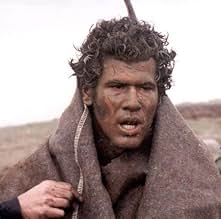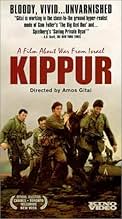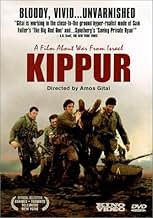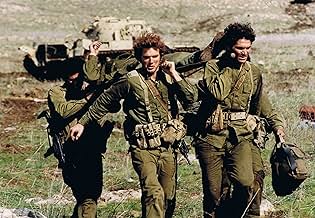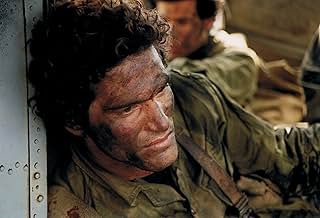VALUTAZIONE IMDb
6,3/10
2003
LA TUA VALUTAZIONE
Quando scoppia la guerra dello Yom Kippur, due soldati israeliani si trovano incapaci di localizzare la loro unità. Desiderosi di prendere parte allo sforzo bellico, si uniscono a un'unità d... Leggi tuttoQuando scoppia la guerra dello Yom Kippur, due soldati israeliani si trovano incapaci di localizzare la loro unità. Desiderosi di prendere parte allo sforzo bellico, si uniscono a un'unità di evacuazione medica aerea.Quando scoppia la guerra dello Yom Kippur, due soldati israeliani si trovano incapaci di localizzare la loro unità. Desiderosi di prendere parte allo sforzo bellico, si uniscono a un'unità di evacuazione medica aerea.
- Premi
- 2 vittorie e 6 candidature totali
Uri Klauzner
- Dr. Klausner
- (as Uri Ran-Klausner)
Juliano Mer-Khamis
- The Captain
- (as Juliano Mer)
Liat Glick
- Dina
- (as Liat Glick Levo)
Noah Faran
- Rescue Commander
- (as Noach Faran)
Recensioni in evidenza
Those here who have bashed the film have grossly misunderstood Kippur. Either they look for a blow-blam-bang Holy-wood flick, which it isn't; or for a highly reliable reconstruction (which Save Private Ryan, extolled by some, is only in part: the first scene is almost like-it-really-was, the last scene is blow-blam-bang with Matt Damon and Tom Hanks instead of Chuck Norris and Steven Seagal). Kippur is a highly personal film, in that war is filtered through the very personal point of view of a sophisticated director. Amos Gitai is close to Antonioni; and in directing a war movie he couldn't forget the Lesson of the Master. Hence the minimal dialogue, hence the dilated times, hence the attention to the setting more than the characters. You try to watch Deserto rosso and then Kippur and you'll notice just how much they have in common. Then, if you don't like Antonioni, it's your own business, go for the blow-blam-bang stuff. However, as for action movies, I think Black Hawk Down is better than SPR. I may be wrong...
Kippur (2000) Directed by Amos Gitai Starring: Liron Levo, Tomer Russo, Uri Klausner, Yoram Hattab, and Guy Amir ***1/2 out of 5 stars
Forgive me if I see the good in everything, but I believe that this Israel film, which features excruciatingly long takes and little dialogue, DOES have some deep significance. However, the long takes ARE draining, yet when you realize the purpose, it all seems to make sense.
Based on Israeli filmmaker Amos Gitai's personal experiences in the Yom Kippur war in 1973, in which Egyptian and Syrian forces attacked Israel on their holy day of Yom Kippur, "Kippur" follows a search and rescue team of four people as they travel by helicopter to different war-torn areas to find as many people alive as possible and bring them to some sort of safety and medical treatment. The film begins with two characters, Ruso (Yes, Russo) and Weinraub (Levo), who find themselves abruptly trying to get into a war. One of the characters (Ruso, I believe) is eager to get to the battlefront, proclaiming that a war has finally reached their generation and that "it is ours!". You must understand that Israel has been going through a war at least once, if not twice a decade. So, war, to the naive, inexperience individual, seems like a rite of passage.
Ruso and Weinraub, after awkwardly entering the front lines and being told to go back as shells are heard closeby, stop on the side and meet up with Gadassi (Amir), a medical officer trying to find a ride to the mission briefing. When they finally get to the battlefield to start the search and rescue, you soon find out that the film is about the death, detachment, and irrationality of war. What began as a rite of passage for the characters ended up being a strange, tortured nightmare. They go from area to area finding amputees and dead soldiers, usually unable to help all and having to leave much of the bodies on the battlefield. One torturous take follows the four characters as they try to help a soldier, who is hurt and obviously alive, out of a big field of mud. As they fall and slip, the soldier's body is thrown around, unintentionally carelessly. The frustration takes over one of the soldiers helping him as he breaks down in the middle of the mud and the doctor is going back and forth trying to calm the panicking soldier and help the injured one. When they finally make it to some other officers waiting for them to take the soldier away, he is already dead and the helplessness on the soldier's muddy faces says it all.
This film can be and will be very draining for most viewers. The long takes and the often far away framing distances ourselves from the action and you should soon learn to explore and examine what Gitai is trying to convey through the characters' stories. The film DOES build up to a briefly explosive climax, which poetically brings everything full circle for the soldiers. "Kippur" is a difficult film appropriate for its difficult subject. It is also daring, unwavering in its message, and, most importantly, truthful to the nonsense that war really is.
Forgive me if I see the good in everything, but I believe that this Israel film, which features excruciatingly long takes and little dialogue, DOES have some deep significance. However, the long takes ARE draining, yet when you realize the purpose, it all seems to make sense.
Based on Israeli filmmaker Amos Gitai's personal experiences in the Yom Kippur war in 1973, in which Egyptian and Syrian forces attacked Israel on their holy day of Yom Kippur, "Kippur" follows a search and rescue team of four people as they travel by helicopter to different war-torn areas to find as many people alive as possible and bring them to some sort of safety and medical treatment. The film begins with two characters, Ruso (Yes, Russo) and Weinraub (Levo), who find themselves abruptly trying to get into a war. One of the characters (Ruso, I believe) is eager to get to the battlefront, proclaiming that a war has finally reached their generation and that "it is ours!". You must understand that Israel has been going through a war at least once, if not twice a decade. So, war, to the naive, inexperience individual, seems like a rite of passage.
Ruso and Weinraub, after awkwardly entering the front lines and being told to go back as shells are heard closeby, stop on the side and meet up with Gadassi (Amir), a medical officer trying to find a ride to the mission briefing. When they finally get to the battlefield to start the search and rescue, you soon find out that the film is about the death, detachment, and irrationality of war. What began as a rite of passage for the characters ended up being a strange, tortured nightmare. They go from area to area finding amputees and dead soldiers, usually unable to help all and having to leave much of the bodies on the battlefield. One torturous take follows the four characters as they try to help a soldier, who is hurt and obviously alive, out of a big field of mud. As they fall and slip, the soldier's body is thrown around, unintentionally carelessly. The frustration takes over one of the soldiers helping him as he breaks down in the middle of the mud and the doctor is going back and forth trying to calm the panicking soldier and help the injured one. When they finally make it to some other officers waiting for them to take the soldier away, he is already dead and the helplessness on the soldier's muddy faces says it all.
This film can be and will be very draining for most viewers. The long takes and the often far away framing distances ourselves from the action and you should soon learn to explore and examine what Gitai is trying to convey through the characters' stories. The film DOES build up to a briefly explosive climax, which poetically brings everything full circle for the soldiers. "Kippur" is a difficult film appropriate for its difficult subject. It is also daring, unwavering in its message, and, most importantly, truthful to the nonsense that war really is.
I disagree with most of the comments of the other commentors. This film is not a "History of Yom Kippur War" It is a very realistic attempt to see the war through a personal eyes of a Reserve Soldier suddenly called up and "Thrown" in to a War. It is 30 years since that war which is contraversial in Israel because we were caught by surprise by Egypt and Syria. On the other side within less than a month the Israeli army was 30 KM from Damascus and 100 KM from Cairo. I know people killed in that war and like other Israelis think "Kippur" shows the Trauma of that War, And any War. I have visited Egypt a number of times and Hope that, as Saadat said "The October War should be the Last War...". This is my "Apocalypse Now" movie but much more realistic.
As an Israeli's view of war, "Kippur" takes "Thin Red Line"s visual approach, with little plot or explication or context, from the sacred (Yom Kippur mis en scene) to the procreative beginning, to the wounds and exhausted faces of the soldiers.
This is a war where a soldier takes his used Fiat right up to the front and back again to his girlfriend's front door. Unlike "Tigerland" where the soldiers are young neophytes with taut basic training bodies, these are lean, lanky, long-haired chain-smoking, experienced reservists who pretty much pick and choose where they'll serve. Instead of the usual U.S. barking sergeant, this unit is based on long-term friendship, training, coordination, shared goals and consensus. Fodder for discussion on military management styles. And I can't think of another war movie where a guy named Weinraub is as sexy looking.
Even my husband, who is a devotee of the War Channel and thought it was way too arty (and amazingly this was from the same director who did the agit-prop anti-Orthodox domestic drama "Kadosh") found one long sequence with almost no dialog very effective, as the medics try to rescue the wounded in the mud.
The projectionist shut down the credits before it was finished.
(originally written 12/2/2000)
This is a war where a soldier takes his used Fiat right up to the front and back again to his girlfriend's front door. Unlike "Tigerland" where the soldiers are young neophytes with taut basic training bodies, these are lean, lanky, long-haired chain-smoking, experienced reservists who pretty much pick and choose where they'll serve. Instead of the usual U.S. barking sergeant, this unit is based on long-term friendship, training, coordination, shared goals and consensus. Fodder for discussion on military management styles. And I can't think of another war movie where a guy named Weinraub is as sexy looking.
Even my husband, who is a devotee of the War Channel and thought it was way too arty (and amazingly this was from the same director who did the agit-prop anti-Orthodox domestic drama "Kadosh") found one long sequence with almost no dialog very effective, as the medics try to rescue the wounded in the mud.
The projectionist shut down the credits before it was finished.
(originally written 12/2/2000)
The Yom Kippur war almost caught Israel unawares. Twenty days later they were across the Suez 100km from Cairo and near as many from Damascus, another disaster for the Arabs. In a strange turn of events however, the surprise attack and doom-laden buildup to it, with thousands of graves dug in anticipation, had a devastating effect on the country, in effect signaling a perpetual state of fear and alert.
I am in the middle of exploring through films these bumps in the national mind, which brought me here. For what it's worth, the filmmaker has decided to capture an experience of war as purely about what it means to be there as he can. He knows, he was there.
Sadly, it's flat beyond belief. For better or worse I found it to be nothing like Thin Red Line, as others have mentioned in their comments. Whereas Malick spins war to be one of conflicting urges in the soul, this is what we see, two hours of med- evacs carrying the wounded.
There's one contemplative image in the film, a helo shot of a muddy battlefield with maneuvering tanks drawing meaningless patterns on the mud, contrasted with the early shot of the lush mingling of painted sex evocative of life, color, imagination, spontaneity. It's a great shot, and perfectly describes both what the film wants to portray, a sort of aimless cosmos, and what it ends up with—aimless doodling on the ground.
So the filmmaker reminisces in film about a time and place that allowed no skyward gaze. The important message is that war is as wasteful and pointless to happen in real life as it is to watch in this film.
I am in the middle of exploring through films these bumps in the national mind, which brought me here. For what it's worth, the filmmaker has decided to capture an experience of war as purely about what it means to be there as he can. He knows, he was there.
Sadly, it's flat beyond belief. For better or worse I found it to be nothing like Thin Red Line, as others have mentioned in their comments. Whereas Malick spins war to be one of conflicting urges in the soul, this is what we see, two hours of med- evacs carrying the wounded.
There's one contemplative image in the film, a helo shot of a muddy battlefield with maneuvering tanks drawing meaningless patterns on the mud, contrasted with the early shot of the lush mingling of painted sex evocative of life, color, imagination, spontaneity. It's a great shot, and perfectly describes both what the film wants to portray, a sort of aimless cosmos, and what it ends up with—aimless doodling on the ground.
So the filmmaker reminisces in film about a time and place that allowed no skyward gaze. The important message is that war is as wasteful and pointless to happen in real life as it is to watch in this film.
Lo sapevi?
- QuizThe film is based on director Amos Gitai's own experience of joining a helicopter rescue crew during the war of Kippur, and his helicopter being shot down by a Syrian missile on his 23rd birthday.
- BlooperMoshe Dayan did NOT lose his eye in the Sinai Desert; he lost it in Vichy-controlled Lebanon in 1941 on a reconnaissance mission on behalf of the Australian/British Army.
- ConnessioniFeatured in Sodankylä ikuisesti: Elokuvan vuosisata (2010)
I più visti
Accedi per valutare e creare un elenco di titoli salvati per ottenere consigli personalizzati
- How long is Kippur?Powered by Alexa
Dettagli
- Data di uscita
- Paesi di origine
- Siti ufficiali
- Lingue
- Celebre anche come
- Киппур
- Luoghi delle riprese
- Nehushtan, Tel Aviv, Israele(studio: house interiors)
- Aziende produttrici
- Vedi altri crediti dell’azienda su IMDbPro
Botteghino
- Lordo Stati Uniti e Canada
- 114.283 USD
- Fine settimana di apertura Stati Uniti e Canada
- 17.007 USD
- 5 nov 2000
- Lordo in tutto il mondo
- 114.283 USD
- Tempo di esecuzione
- 1h 57min(117 min)
- Colore
- Mix di suoni
- Proporzioni
- 1.85 : 1
Contribuisci a questa pagina
Suggerisci una modifica o aggiungi i contenuti mancanti


